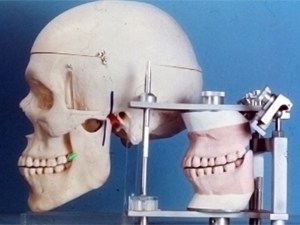Dental Articulator
Dental Articulator – are instruments that attempt to reproduce the range of movement of the jaws. Maxillary and mandibular casts are attached to the articulator so that functional and parafunctional contact relations between the teeth can be studied. The most common use of the articulator is in the diagnosis and the arrangement of artificial teeth. There are a wide variety of articulators, some as simple as having nothing more than a hinge. To the very complex which aim to mimic all the nuances of jaw movements. It must be stated that no articulator exactly reproduces the full range of jaw movement, nor is the full range necessary for designing proposes.
- Centric relation is the first essential record that is used to mount the casts on the articulator. Thus, the casts are related together in centric relation and at the selected vertical dimension of occlusion.
- The condylar elements help to determine protrusive excursions. This is important in determining accurate contact relations. Typical average values for the articulator is 33 degrees.
- Incisal elements can also be determined, which is important determine accurate overbit + overjet relations. This becoming significant in determine appropriate aesthetics + phonetics.
- Further, articulator become important in determine the occlusion + placement of teeth either for complete or partial dentures. Depending on the case, either a balance or unbalanced occlusion may be sought, with the use of the articulator the operator can manipulate the casts to determine the most appropriate lateral + protrusive excursions.
Types of articulators – simple hinge, fixed condylar path, semi adjustable, fully adjustable
– Articulators allow for one to analyse, control, create, and improve -> sliding contacts -> to avoid stress concentration
Purposes & uses of the Dental Articulator
- To hold the maxillary and mandibular casts in a determined fixed relationship
- To simulate jaw movements
- To diagnose the state of occlusion in both natural and artificial dentitions
- To plan dental procedures based on relationship between opposing natural and artificial teeth, eg. Evaluation of possibly balanced occlusion
If you wish for more information please do not hesitate to contact Skygate Dental today on (07) 3114 1199 or 0406 579 197.


